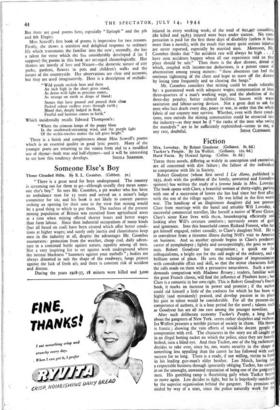Someone Else's Boy
Those Clouded Hills. By B. L. Coombes. (Cobbett. 5s.) "There is a great need for boys underground. The country is screaming out for them to go—although usually they mean some- one else's boy." So says Mr. Coombes, a pit worker who has been an ambulance man for 15 years and served on a miner's lodge committee for six; and his book is not likely to convert parents seeking an opening for their sons to the view that mining would be a good thing to which to put them. The nucleus of the present mining population of Britain was recruited from agricultural areas at a time when mining offered shorter hours and better wages than farm labour. Since then industrial occupations of many kinds (but all based on coal) have been created which offer better condi- tions at higher wages; and surely only inertia and clannishness keep men in the industry at all, despite the advantages Mr. Coombes enumerates : protection from the weather, cheap coal, daily adven- ture in a continual battle against nature, equality among all men. Not a very inspiring list to set against work underground where the intense blackness "hammers against your eyeballs" ; bodies are always distorted to suit the shape of the roadways; lungs protest against the lack of fresh air; and there is constant risk of accident and disease.
During the years 1928-37, 18 miners were killed and 3,000
injured in every working week; of the total of 602,497 casualties, 280 killed and 59,853 injured were boys under sixteen. No com- pensation is paid for the first three days of disability (unless it lasts more than a month), with the result that many quite serious injuries are never reported, especially by married men. Moreover, Mr. Coombes thinks that "the accident rate will always be high . . . I have seen accidents happen when all our experience told us that place should be safe." Then there is the dust disease, dread of which, coupled with income-tax deductions, is a potent cause of absenteeism among young miners : " these absentees can feel the ominous tightening of the chest and hope to stave off the disease by losing time frequently and so clearing the lungs."
Mr. Coombes considers that mining could be made tolerable by : a guaranteed week with adequate wages; compensation at least three-quarters of a man's working wage, and the abolition of the three-day penalty; better cultural facilities; houses with water sanitation and labour-saving devices. Not a great deal to ask for men who face death every day, peace or war, in order that the whole fabric of our country may survive. Whether, even with these condi- tions, men outside the mining communities could be attracted into the industry—as they must be if "the ranks of the men who swing the mandrels" are to be sufficiently replenished—seems to me, at


























 Previous page
Previous page